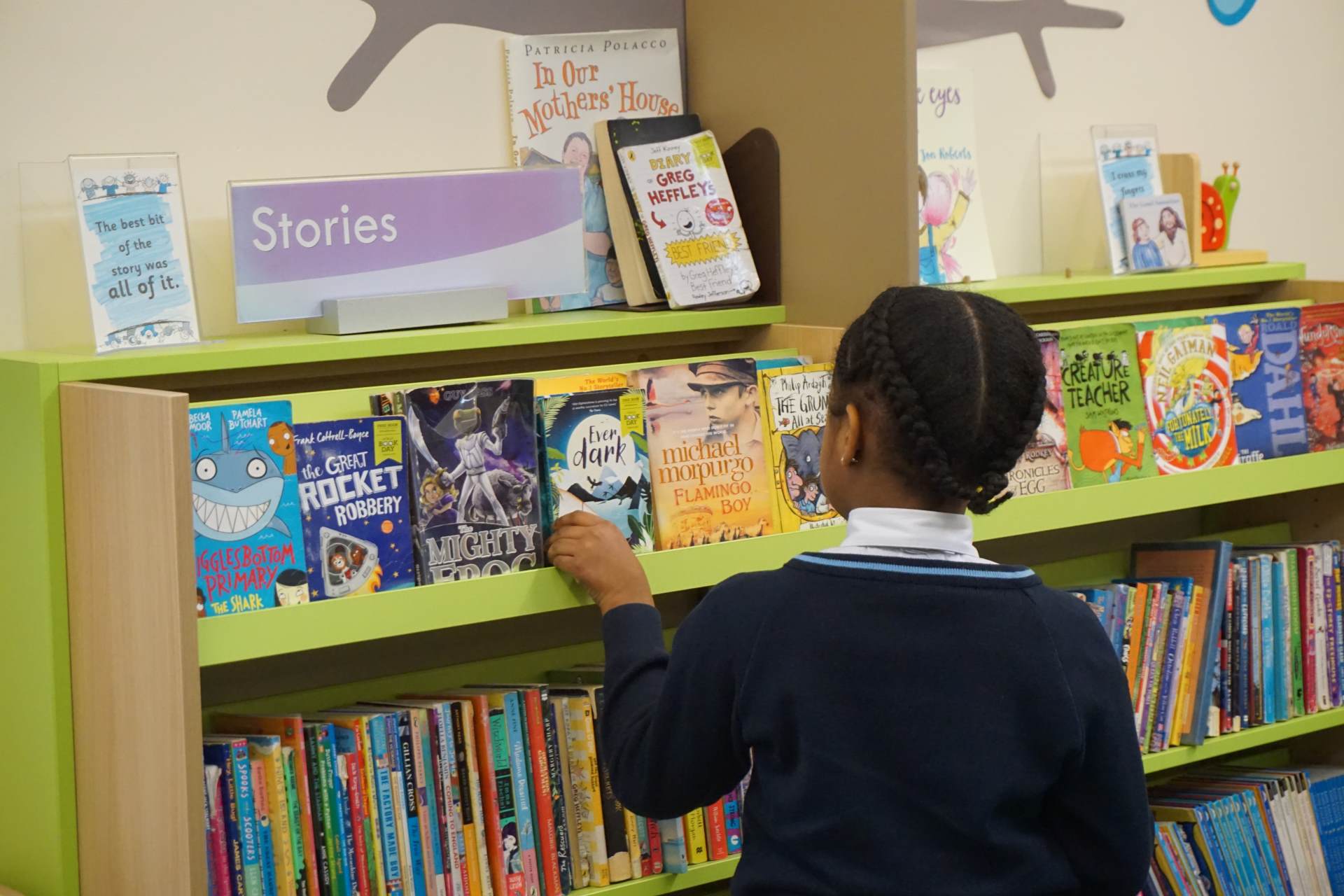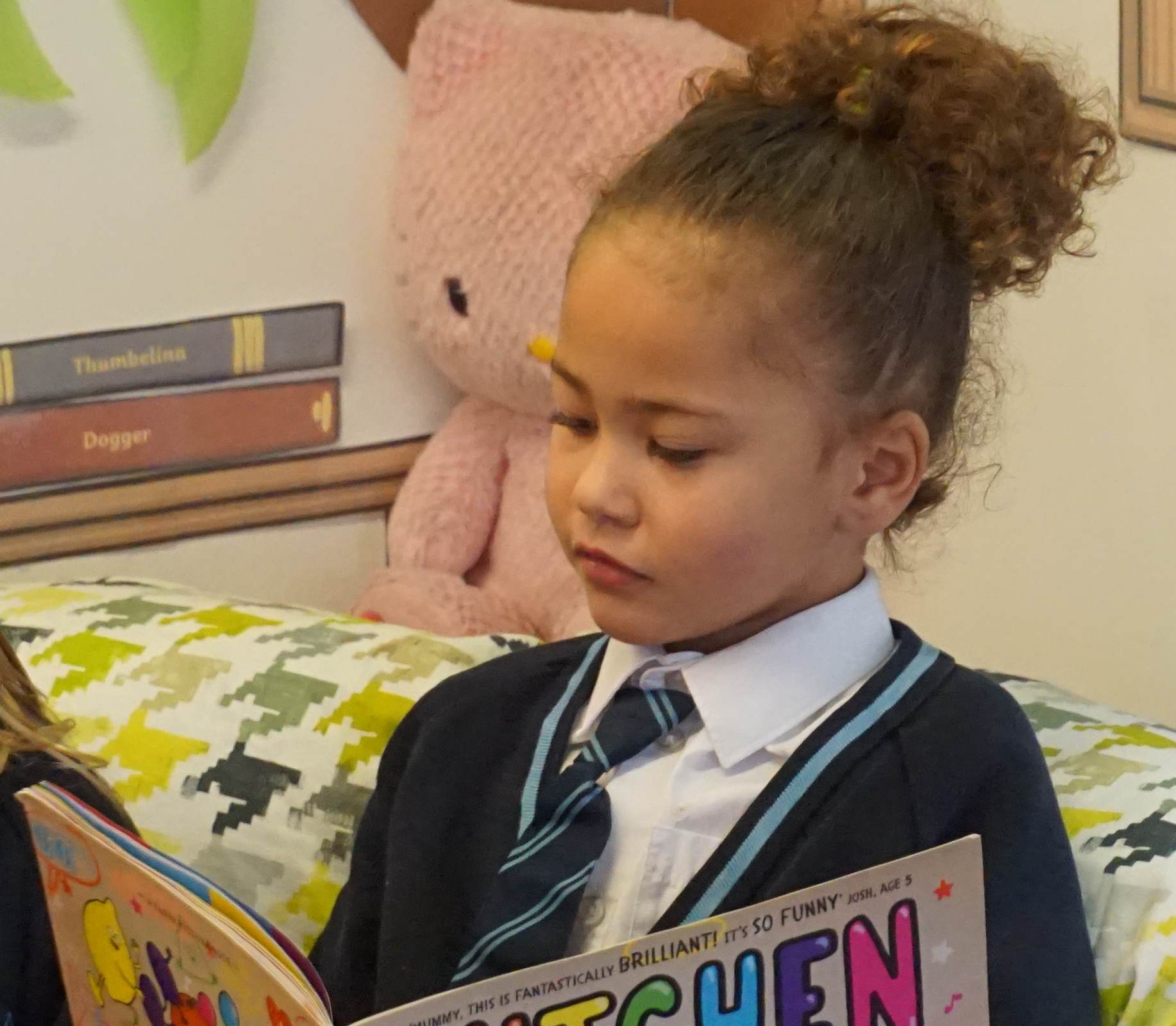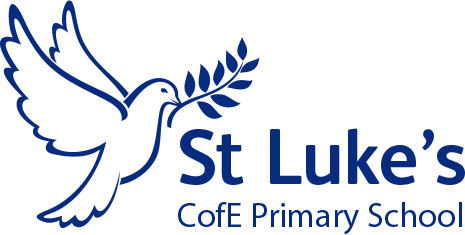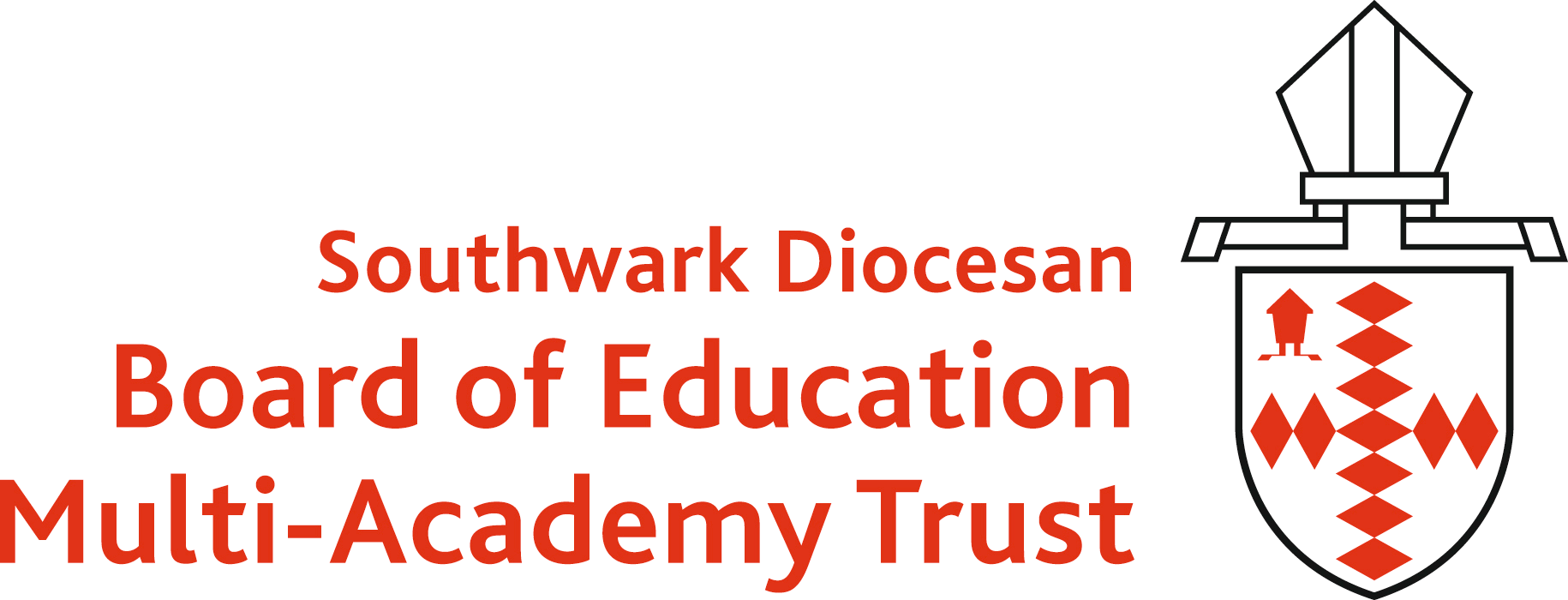English at St Luke's
At St Luke's, we have adopted a thematic approach to the teaching of writing that places children’s literature at its core. The school has recently become a subscriber to ‘The Literary Curriculum’, developed by The Literacy Tree, to help support us in providing pupils with a broad range of high-quality writing experiences.
During their time in our school, children participate in a wide variety of topic based learning, each focus being centred around core literacy texts which are used, alongside stimulating trips and experiences, to promote high-quality writing across all aspects of the curriculum.
Our Intent for English and Literacy
The purpose of this document is to clarify the ‘how, why, and what’ of English teaching at St Luke's. This is to be used by staff to clarify expectations, highlight the resources that we have at our disposal, and to ensure that a high-quality English curriculum is being taught to all. At St Luke's, we want to ensure that our children will make a profound, positive impact to the outcomes of every child. The importance of being literate has never been more important in our society, and those who struggle to read and write are at a catastrophic disadvantage. Studies show that children who leave primary school able to read and write, are much more likely to be successful in later life.
At St Luke's we are not just attempting to teach the fundamental skills and knowledge so that our children are capable; we are aiming to instil in them a love of independently pursuing their development of literacy. We aim to create life-long readers, who engage in a wide range of books for both information and pleasure, who are able to apply their skills and learning into other areas of their lives and education.
Staff receive regular CPD on the teaching and planning of English within school, and take part in the continual moderation and assessment of writing.
How we implement our English Curriculum
At St Luke's, we teach English every day, along with separate handwriting, phonics and comprehension lessons. This ensure that children have a suitable level of exposure to all areas of the English curriculum. Weekly English homework is also sent home with age-appropriate spellings to be learned, aiding the development of their vocabulary.
Each child will receive a Reading Record at the beginning of the year, where they will keep a written record of their reading with adults outside of school. Children are encouraged to read at home every day and also bring their reading books to school every day in order to take advantage of reading at any opportunity.
Every class should be rich in language, speaking and listening, with a culture of children reading in lessons at every opportunity (from the board, reading questions aloud etc.). Teachers will at all times model the correct spoken language of English along with the standard of handwriting expected while both writing on the board and in class marking.
We aim to use high quality books that offer opportunities for empathy and can aid philosophical enquiry, as a means of developing spoken language requirements through debate, drama and discussion using the issues raised through, and within, the text. These are then used as a basis for writing opportunities that are meaningful; whether short or long, where children are able to develop a clear sense of the audience that they are writing for. We want our children to have real reasons to write, whether to explain, persuade, inform or instruct and that where possible, this is embedded within a text or linked to a curriculum area.
Our Approach to Teaching Reading and Phonic Skill

Learning to read is one of the most important things your child will learn at our school. Everything else depends on it, so we put as much energy as we possibly can into making sure that every single child learns to read as quickly as possible.
We want your child to love reading – and to want to read for themselves. This is why we work hard to make sure children develop a love of books as well as simply learning to read.
Phonics at St Luke's

Read Write Inc Phonics Scheme
Read, Write, Inc is a phonics scheme designed and developed by Ruth Miskin, one of the country’s leading authorities on teaching children to read. The programme aims to create fluent readers, willing writers and confident speakers. As a school, we have recently invested in this resource because we want our children to learn to read as quickly as possible, and then read widely and become lifelong readers.
Five key principles underpin the teaching in all Read Write Inc. sessions:
1) Participation – As they are in small groups, children participate fully in every session. They are able to maintain high levels of concentration and they do not miss key elements of the teaching.
2) Praise – Children work together as partners. They take turns to teach and praise each other. They are motivated by praise from their teachers and teaching assistants.
3) Pace – Sessions never drag. The lively pace keeps every child fully engaged and on task.
4) Purpose – Every instructor has been trained in Read Write Inc. methods. They know the purpose of each activity, and how it leads into the next.
5) Passion – Instructors, too, become passionate about their teaching as they see the children enjoying the progress they are making.
Staff have been being trained to a high standard to teach the programme effectively with small groups of children. These groups are organised according to their specific needs, and the specific sounds and letters are taught in fun and engaging ways.
Each session will last about 20 minutes rising to an hour and includes a variety of activities delivered with pace and rigor. Children will have the opportunity to learn sounds that are reinforced during the session with reading and writing activities – learning is then put into practice.
As children progress through the levels, they will be regularly assessed to ensure they are placed in groups most appropriate for them. Children may also be ‘fast-tracked’ to a more able group when their progress warrants this.

We will be implementing the new scheme during the current academic year. Kindly see the video below. This video, taken from the Ruth Miskin website, explains the scheme in more detail:
Reading at St Luke's
Once children can blend sounds together to read words, they practise reading books that match the phonics and the ‘tricky words’ they know. They start to believe they can read and this does wonders for their confidence.
Teachers regularly read to the children, too, so the children get to know and love all sorts of stories, poetry and information books. This helps to extend children’s vocabulary and comprehension, as well as supporting their writing. Throughout school reading skills are also taught using a wide range of materials. Children develop reading skills through daily guided reading, shared reading and individual reading sessions.
Up until the end of Year 2, your child will work with children who are at the same reading level. This is so that the teaching can be focused on their needs. Some older children will continue to access phonics groups using resources from the Rapid Reading Programme if they need further consolidation and development of reading skills. We check children’s reading skills regularly so that we can ensure they are in the right group. Children will move to a different group if they are making faster progress or may have one-to-one support if we think they need some extra help.
Key Stage 2 Reading
Once children have completed Read Write Inc phonics, our learners continue their reading journey through whole class reading sessions. Learners focus on the 6 domains of the reading curriculum; Vocabulary, Inference, Prediction, Explain, Retrieve and Summarise. These are the key areas which we feel children need to know and understand in order to improve their comprehension of texts. The 6 domains focus on the comprehension aspect of reading and not the mechanics: decoding, fluency and prosody. Pupils and teachers read and engage with both the core text and bespoke supplementary texts to ensure pupils are exposed to a range of genres and disciplinary reading.
Our Reading CurriculumClick here for our whole-school reading overview
Reading Progression of Skills and Knowledge
Click here for our Progression of Skills and Knowledge in Reading Document
Pleasure for Reading
‘Developing a love of reading can be more important for a child’s educational success than their family’s socio-economic background.’ Unlocking the world of books can have a profound influence on children’s future lives. Every child deserves the chance to become a reader, and if we’re going to get every child to enjoy reading, it has to be schools that are the driving force.
Click on the link below for St Luke's pleasure for reading book recommendations. These books are available in our school library and West Norwood's public library.
Phonics Screening Check
In the summer term, the government asks us to do a phonics check of all the Year 1 children. We will let you know how well your child has done.
Please continue to the end to see our revised Reading Curriculum.
How long will it take to learn to read well?
Every child is different and children will learn to read at different speeds. By the end of Year 2, most children will be able to read aloud books that are at the right level for his or her age. In Year 3 and beyond, we concentrate more on helping children to understand what they are reading, although this work begins very early on.
What can Parents/carers do to help?

Within the first two weeks of your child starting Reception, you will be invited to a meeting so that we can explain how we teach reading and show you the resources we use. During the meeting, there are lots of suggestions on how you can help your child to read. Your support really does get your child off to a flying start and encourages them to make great progress!
You can help your child to sound out the letters in words and then to ‘blend’ the sounds together to make a whole word. Try not to refer to the letters by their names. Help your child to focus on the sounds. You can hear how to say the sounds correctly by searching on YouTube for ‘Read Write Inc. Phonemes Pronunciation Guide’
Sometimes your child might bring home a picture book that they know well. Please don’t say, ‘This is too easy.’ Instead, encourage your child to tell you the story out loud; ask them questions about things that happen or what they think about some of the characters in the story.
Make reading fun! Remember to keep reading to your child. They will come across far more adventurous words than they will in their early reading books. You will be helping them to grow a vast vocabulary and understand the meaning of different stories etc. It will also encourage them to love books and want to read more!
To access a wide variety of free e-Books, click on www.oxfordowl.co.uk.
Go to the Reading Section then follow the link to e-Books and choose a book.
St Luke's Writing Overview
Skills Progression in English
Click here to access or Progression of Skills in Writing Document
Our Approach to Handwriting at St Luke's
At St Luke's, we have high expectations about the presentation of written work across the curriculum. We have a well-established Handwriting programme that begins in EYFS where the children are taught the appropriate posture and grip for writing and they learn to form their letters correctly in preparation for writing cursively by the end of Key Stage 1.
Our Approach to Grammar, Punctuation and Spelling
To provide a more meaningful context and a clearer understanding of expectations, the teaching of grammar, punctuation and spelling are embedded in our whole-school thematic approach. We provide complete coverage of all National Curriculum expectations for writing composition, grammar, punctuation and vocabulary, as well as coverage of spelling, phonics and reading comprehension as part of our topic based learning.
Our Planned Impact
The impact on our children is clear: progress, sustained learning and transferrable skills. With the implementation of the writing journey being well established and taught thoroughly in both key stages, children are becoming more confident writers and by the time they are in upper Key Stage 2, most genres of writing are familiar to them and the teaching can focus on creativity, writer’s craft, sustained writing and manipulation of grammar and punctuation skills.
Children will be given continuous opportunities to develop their reading, writing, speaking and listening across all areas of the curriculum. We aim that, by the time our children have left our care, that they have developed a love of reading along with a strong foundation of writing, so that they are equipped to apply these skills to any area of their lives. We aim to provide all children, regardless of their backgrounds, with the necessary tools to excel.





